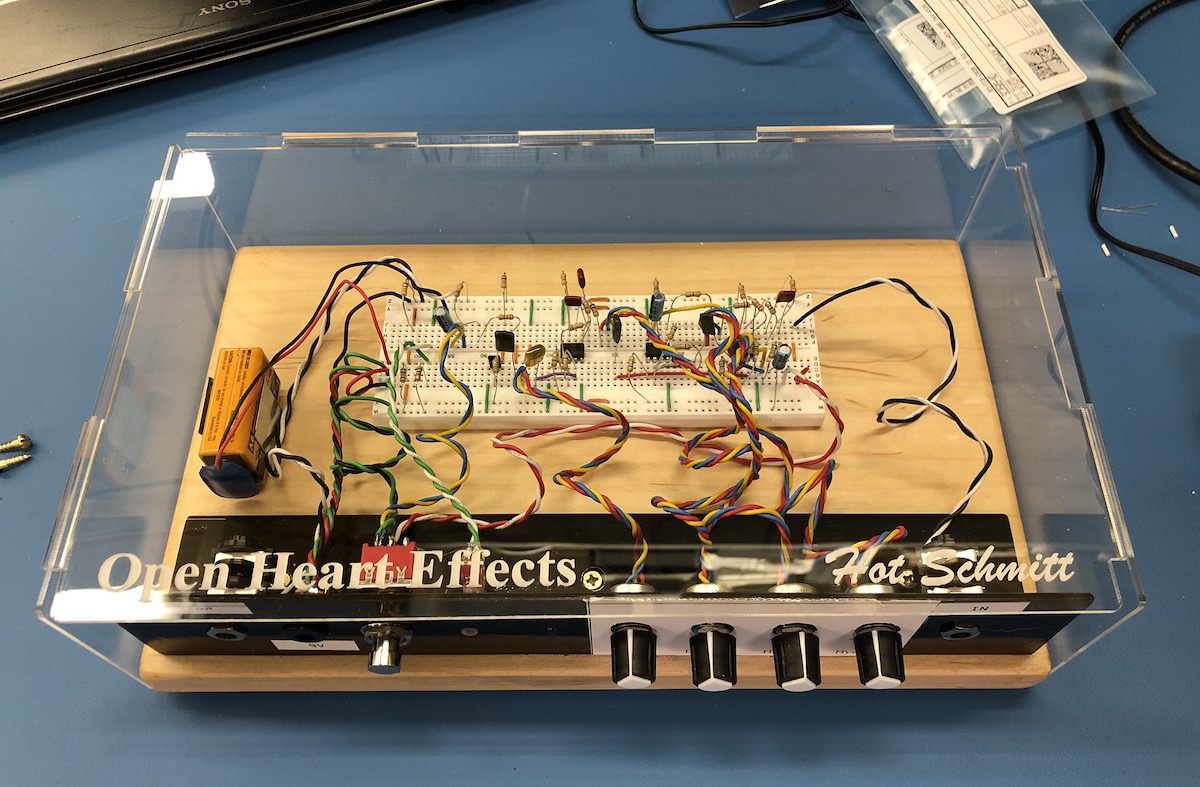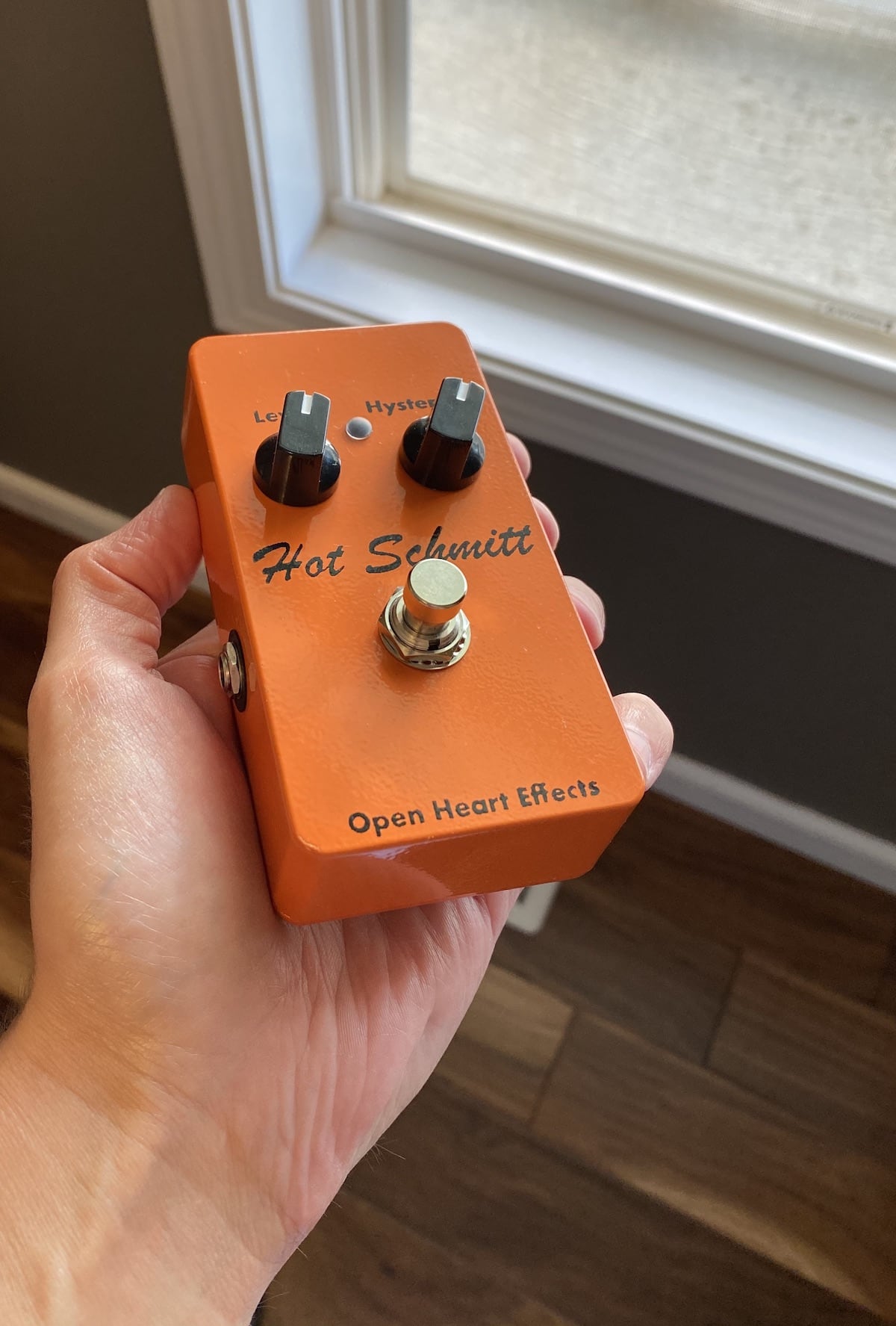
These are some notes about the major revisions we made while developing Hot Schmitt, our new fuzz pedal. If you'd like to see the finished product, we have a page about that too.

Our first prototype is a basic demonstration of using a Schmitt trigger to produce fuzz. It includes an adjustment for trigger hysteresis and an output level control. I also snuck in a — perhaps unusual — tone control consisting of a high-pass and low-pass filter each with an adjustable corner frequency.
Initial testing has convinced us we're onto something, but that additional design work will be required to make it a really great guitar effect.
We found the hysteresis control on the first prototype didn't cover as wide of a range as we'd like. The Schmitt trigger fuzz architecture has the interesting property that the sound chokes out suddenly as the sustain runs out. Though it is interesting, we didn't find this to be particularly musical in testing. The tone controls might be useful with further development, but probably not for this particular pedal.
Our second prototype runs on a single eighteen volt supply to get more headroom, reduce the relative effect of offset voltage, and facilitate wider range on the hysteresis control. It also includes a new path from the input buffer past the Schmitt trigger and straight into the level-limit stage, with adjustable drive. At the very end of the sustain, this helps smooth out the transition from Schmitt trigger fuzz to silence. This revision also drops the adjustable low-pass corner frequency, replacing it instead with a fixed-frequency that we arrived at through testing.
I think we're moving in the right direction.
We like the benefits of the eighteen-volt supply, but thought it would be nice if the pedal could run on a single nine-volt battery.
This prototype brings back the 9V battery and adds a charge pump to produce a -9V rail locally and adjusts the op-amp stages to take advantage of the split supply.
I've started looking at mechanical design. It might be a tight fit, but I think we can fit this effect in a standard 1590B enclosure.
We've continued to think about the sound and experiment with the available adjustments, but this revision was mostly about hammering out the power arrangements, switching, and other interface type stuff.
After careful consideration, we've dumped the drive and bass controls. It just plain sounds best with both wide-open. In hours of play-testing, Edgar could identify no circumstance in which it made sense to have less balls. This revision also adds additional power input protection and make some other minor tweaks.
We've been looking at a lot of different knobs, trying to find just the right one. I think we've got a good one picked out, but I need to reach out to the manufacturer to see about getting more than just sample quantities.
We were picking up some feedback, in part I think from having the power supply go through the input jack (to turn the effect on when a plug is inserted). This revision adds a MOSFET to switch the power indirectly, without taking it through the jack. This should make it easier to keep noisy power stuff in its own part of the board layout too. I think we've been happy with the basic sound for a few revisions, but this revision makes some (hopefully final) tweaks to the sound just as sustain runs out.
It took a lot of work in CAD, but I've made up a set of drilling fixtures and produced a basic mechanical prototype. I think everything will fit, but I still need to do a PCB layout. Getting good silk-screening results has been challenging, but I think I'm getting better at it.

Turns out I had the input and output jacks flipped on the PCB layout I did based on Revision F. Woops 😂. This revision corrects that and makes some small tweaks to resistor values. I found out there's a slightly smaller version of the knob that we liked. I think we might end up going with it: it seems to handle just as well and it gives a little more room for big fingers between the knobs.
Subscribe to our newsletter and be the first kid on your block to get our latest pedal write-ups and tear-downs and to hear about the pedals we're working on. We can drop you an email when we post new stuff if you sign up.
Parks Digital LLC